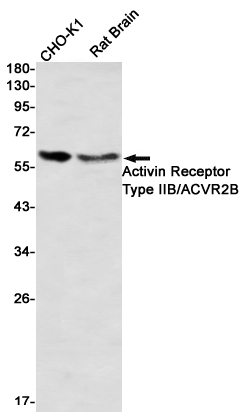
| WB | 1/500-1/1000 | Human,Mouse,Rat,Hamster |
| IF | 咨询技术 | Human,Mouse,Rat,Hamster |
| IHC | 咨询技术 | Human,Mouse,Rat,Hamster |
| ICC | 技术咨询 | Human,Mouse,Rat,Hamster |
| FCM | 咨询技术 | Human,Mouse,Rat,Hamster |
| Elisa | 咨询技术 | Human,Mouse,Rat,Hamster |
| Aliases | ActR IIB; ACVR 2B; HTX4 |
| Entrez GeneID | 93 |
| WB Predicted band size | Calculated MW: 58 kDa; Observed MW: 58 kDa |
| Host/Isotype | Rabbit IgG |
| Antibody Type | Primary antibody |
| Storage | Store at 4°C short term. Aliquot and store at -20°C long term. Avoid freeze/thaw cycles. |
| Species Reactivity | Human,Mouse,Rat,Hamster |
| Immunogen | A synthetic peptide of human Activin Receptor Type IIB/ACVR2B |
| Formulation | Purified antibody in TBS with 0.05% sodium azide,0.05%BSA and 50% glycerol. |
+ +
以下是关于Activin Receptor Type IIB(ACVR2B)抗体的3篇代表性文献摘要:
---
1. **文献名称**: *Blockade of ActRIIB signaling triggers muscle hypertrophic remodeling by myostatin inhibition*
**作者**: Lee SJ, et al.
**摘要**: 该研究报道了一种ACVR2B抗体通过选择性抑制肌肉生长抑制素(myostatin)和激活素(activin)信号通路,显著增加小鼠骨骼肌质量和力量,同时减少脂肪积累,为治疗肌肉萎缩疾病提供了理论支持。
---
2. **文献名称**: *ACVR2B-Fc counteracts cancer cachexia by inhibiting activin and myostatin signalling*
**作者**: Zhou X, et al.
**摘要**: 研究显示,ACVR2B-Fc融合抗体通过阻断激活素A和肌肉生长抑制素的信号传导,有效逆转癌症恶病质模型中的肌肉消耗和脂肪代谢异常,同时抑制肿瘤生长,提示其在癌症相关代谢综合征中的治疗潜力。
---
3. **文献名称**: *Antibody-mediated inhibition of the ACVR2B ligand trap improves metabolic dysfunction in obese mice*
**作者**: Koncarevic A, et al.
**摘要**: 该文献证明,靶向ACVR2B的抗体可通过调节骨骼肌和脂肪组织的代谢平衡,改善高脂饮食诱导的肥胖小鼠的胰岛素抵抗和肝脂肪变性,揭示了其在代谢性疾病中的新应用方向。
---
4. **文献名称**: *Targeting ACVR2B for the treatment of muscular dystrophy: Preclinical evidence in mdx mice*
**作者**: Morine KJ, et al.
**摘要**: 研究利用ACVR2B抗体干预杜氏肌营养不良症(DMD)模型小鼠,结果显示其显著增加肌肉再生能力、减少纤维化,并改善运动功能,为神经肌肉疾病的治疗提供了实验依据。
---
这些文献涵盖了ACVR2B抗体在肌肉生长、癌症恶病质、代谢综合征及肌营养不良等领域的机制与应用研究。
Activin receptor type IIB (ACVR2B) is a transmembrane serine/threonine kinase receptor belonging to the TGF-β superfamily. It plays a critical role in mediating signaling pathways for ligands such as activins, myostatin, and growth differentiation factors (GDFs). Upon ligand binding, ACVR2B forms a complex with type I receptors (e.g., ALK4/5/7), activating downstream SMAD-dependent and non-SMAD pathways to regulate cellular processes like proliferation, differentiation, and apoptosis. Dysregulation of ACVR2B signaling is implicated in diseases including muscle wasting, fibrosis, and cancer.
ACVR2B-targeting antibodies are designed to modulate this pathway. Antagonistic antibodies block ligand-receptor interactions, inhibiting myostatin/GDF signaling to promote muscle growth—a therapeutic strategy for conditions like muscular dystrophy or cachexia. Conversely, agonist antibodies can hyperactivate signaling, potentially treating metabolic disorders or bone diseases. Notably, ACVR2B antibodies have shown promise in preclinical models, with some advancing to clinical trials. Challenges include balancing tissue specificity to minimize off-target effects (e.g., unintended cardiac hypertrophy) and optimizing pharmacokinetics. Research also explores bispecific antibodies or combination therapies to enhance efficacy. As a key node in multiple pathways, ACVR2B remains a compelling target for therapeutic intervention, though further mechanistic studies are needed to refine its clinical application.
×